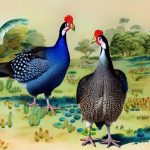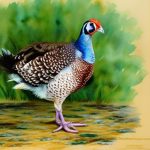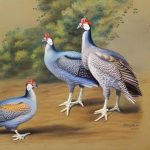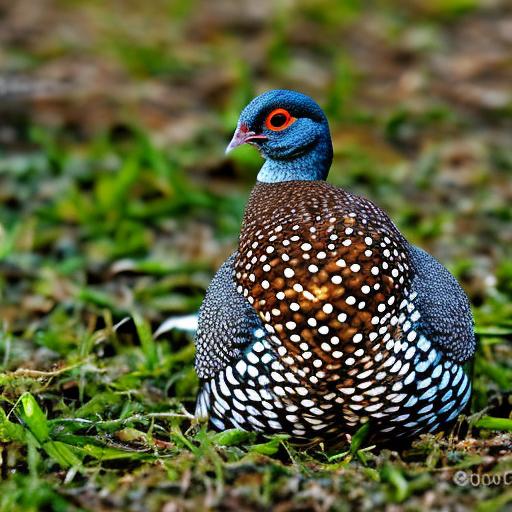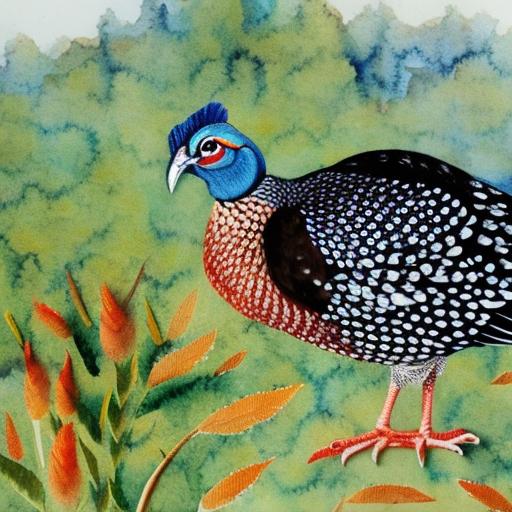Guinea fowl, also known as pintades, are a type of poultry that are native to Africa. They are known for their distinctive appearance, with speckled feathers and a helmet-like crest on their heads. Guinea fowl are popular for their ability to control pests in the garden and for their flavorful meat. There are several different breeds of guinea fowl, each with its own unique characteristics and traits. These breeds vary in size, color, and temperament, making it important for farmers to choose the right breed for their specific needs.
Guinea fowl are hardy birds that are well-suited to a variety of climates and environments. They are known for their ability to forage for food and are often kept on farms to help control insect populations. In addition to their pest control abilities, guinea fowl are also valued for their meat, which is lean and flavorful. They are also known for their eggs, which have a rich, flavorful yolk. With their unique appearance and useful traits, guinea fowl are a popular choice for farmers looking to diversify their poultry flocks.
Table of Contents
- 1 Characteristics of Different Guinea Fowl Breeds
- 2 Popular Guinea Fowl Breeds for Farming
- 3 Rare and Exotic Guinea Fowl Breeds
- 4 Tips for Choosing the Right Guinea Fowl Breed for Your Farm
- 5 Caring for Guinea Fowl Breeds
- 6 Breeding and Raising Guinea Fowl for Profit
- 7 FAQs
- 7.1 What are the different breeds of guinea fowl?
- 7.2 What are the characteristics of the Helmeted Guinea Fowl?
- 7.3 What are the characteristics of the Crested Guinea Fowl?
- 7.4 What are the characteristics of the Vulturine Guinea Fowl?
- 7.5 What are the characteristics of the Plumed Guinea Fowl?
- 7.6 What are the uses of guinea fowl?
Key Takeaways
- Guinea fowl breeds are known for their unique appearance and loud calls, making them popular for pest control and as ornamental birds.
- Different guinea fowl breeds have distinct characteristics such as coloration, size, and temperament, which can influence their suitability for farming.
- Popular guinea fowl breeds for farming include the Helmeted Guinea Fowl, Lavender Guinea Fowl, and Pearl Guinea Fowl, known for their hardiness and adaptability.
- Rare and exotic guinea fowl breeds like the White Crested, Vulturine, and Plumed Guinea Fowl are sought after for their striking appearances and rarity.
- When choosing the right guinea fowl breed for your farm, consider factors such as climate, space, and intended purpose, and seek out reputable breeders for healthy stock.
Characteristics of Different Guinea Fowl Breeds
1. Helmeted Guinea Fowl: The helmeted guinea fowl is the most common and widely recognized breed of guinea fowl. They are known for their distinctive appearance, with a blue-gray body covered in white spots and a helmet-like crest on their heads. Helmeted guinea fowl are medium-sized birds, with males weighing around 3-4 pounds and females weighing around 2-3 pounds. They are known for being hardy and adaptable, making them a popular choice for farmers.
2. White Guinea Fowl: As the name suggests, white guinea fowl are characterized by their pure white feathers. They are a smaller breed of guinea fowl, with males weighing around 2-3 pounds and females weighing around 1.5-2.5 pounds. White guinea fowl are known for being docile and friendly, making them a good choice for farmers who want to keep guinea fowl as pets or for ornamental purposes.
3. Lavender Guinea Fowl: Lavender guinea fowl are known for their unique lavender-colored feathers. They are a rare breed of guinea fowl, with males weighing around 3-4 pounds and females weighing around 2-3 pounds. Lavender guinea fowl are prized for their striking appearance and are often kept for ornamental purposes.
4. Pearl Guinea Fowl: Pearl guinea fowl are characterized by their pearl-gray feathers with white spots. They are a medium-sized breed, with males weighing around 3-4 pounds and females weighing around 2-3 pounds. Pearl guinea fowl are known for being hardy and adaptable, making them a popular choice for farmers.
Popular Guinea Fowl Breeds for Farming
When it comes to farming guinea fowl, there are several popular breeds that are well-suited to the task. The helmeted guinea fowl is perhaps the most popular breed for farming, thanks to its hardy nature and pest control abilities. These birds are excellent foragers and can help keep insect populations in check on the farm. In addition to their pest control abilities, helmeted guinea fowl are also valued for their meat and eggs, making them a versatile choice for farmers.
Another popular breed for farming is the pearl guinea fowl. These birds are known for their hardiness and adaptability, making them well-suited to a variety of farming environments. Pearl guinea fowl are also valued for their meat and eggs, making them a practical choice for farmers looking to raise guinea fowl for food production.
White guinea fowl are also popular for farming, particularly for those who want to keep guinea fowl as pets or for ornamental purposes. These birds are known for their docile and friendly nature, making them a good choice for farmers who want to raise guinea fowl for reasons other than pest control or food production.
Rare and Exotic Guinea Fowl Breeds
In addition to the popular breeds of guinea fowl, there are also several rare and exotic breeds that are prized for their unique characteristics and appearance. Lavender guinea fowl, with their striking lavender-colored feathers, are a rare breed that is often kept for ornamental purposes. These birds are prized for their beauty and are often sought after by collectors and enthusiasts.
Another rare breed of guinea fowl is the vulturine guinea fowl. These birds are known for their striking appearance, with bold blue and white stripes on their feathers and a distinctive vulture-like head. Vulturine guinea fowl are larger than other breeds, with males weighing around 4-5 pounds and females weighing around 3-4 pounds. These birds are prized for their unique appearance and are often kept for ornamental purposes.
Crested guinea fowl are another rare breed that is prized for its unique appearance. These birds have a distinctive helmet-like crest on their heads, giving them a regal and striking appearance. Crested guinea fowl are often sought after by collectors and enthusiasts who appreciate their unique characteristics.
Tips for Choosing the Right Guinea Fowl Breed for Your Farm
When choosing a guinea fowl breed for your farm, there are several factors to consider. First and foremost, it’s important to consider the purpose of raising guinea fowl on your farm. If you’re primarily interested in pest control, then the helmeted guinea fowl is an excellent choice due to its excellent foraging abilities and pest control instincts. If you’re interested in raising guinea fowl for meat or eggs, then breeds like the pearl or lavender guinea fowl may be more suitable due to their larger size and productivity.
It’s also important to consider the climate and environment of your farm when choosing a guinea fowl breed. Some breeds may be better suited to cold climates, while others may thrive in warmer environments. Additionally, consider the space available on your farm and the temperament of the birds you’re interested in. For example, if you have limited space or want to keep guinea fowl as pets, then the smaller and more docile white guinea fowl may be a better choice.
Lastly, consider the availability of the breed you’re interested in. Some rare and exotic breeds may be more difficult to find and may require more specialized care, so it’s important to consider whether you have the resources and knowledge to properly care for these breeds.
Caring for Guinea Fowl Breeds

Caring for guinea fowl breeds requires attention to their specific needs and behaviors. Guinea fowl are social birds that thrive in small groups, so it’s important to provide them with plenty of space to roam and interact with each other. They also require access to fresh water at all times, as well as a balanced diet that includes grains, seeds, insects, and greens.
Guinea fowl also require protection from predators, as they can be vulnerable to attacks from foxes, raccoons, and birds of prey. Providing secure housing at night is essential to keep them safe from harm. Additionally, it’s important to provide them with access to dust baths, as they enjoy rolling around in dry dirt or sand to keep their feathers clean and free from parasites.
Regular health checks and preventative care are also important when caring for guinea fowl breeds. This includes monitoring for signs of illness or injury, as well as providing vaccinations and deworming treatments as needed. It’s also important to provide them with a clean living environment by regularly cleaning their housing and providing fresh bedding.
Breeding and Raising Guinea Fowl for Profit
Breeding and raising guinea fowl can be a profitable venture for farmers who have the knowledge and resources to do so effectively. One way to profit from raising guinea fowl is by selling them as pest control agents to other farmers or gardeners who need help controlling insect populations. Guinea fowl can be an effective natural alternative to chemical pesticides, making them a valuable asset for those looking to manage pests in an eco-friendly way.
In addition to selling live birds, there is also a market for guinea fowl meat and eggs. Guinea fowl meat is lean and flavorful, making it a sought-after product by consumers looking for high-quality poultry products. Similarly, guinea fowl eggs have a rich and flavorful yolk that is prized by those looking for unique and delicious eggs.
Another way to profit from breeding guinea fowl is by selling rare or exotic breeds to collectors or enthusiasts who are willing to pay a premium for these unique birds. Breeding rare or exotic guinea fowl can be a niche market that allows farmers to capitalize on the demand for these special breeds.
Overall, breeding and raising guinea fowl can be a profitable venture when done thoughtfully and with attention to the specific needs of these birds. By choosing the right breed, providing proper care, and identifying potential markets, farmers can successfully raise guinea fowl for profit while enjoying the benefits of working with these unique and valuable birds.
Discover the fascinating world of guinea fowl breeds with our informative poster, showcasing the unique characteristics and traits of these captivating birds. If you’re interested in creating a suitable environment for your guinea fowl, you may also find our article on converting a shed to a chicken coop helpful. Learn how to transform an existing space into a comfortable and secure home for your feathered friends. Check out the article here.
FAQs
What are the different breeds of guinea fowl?
There are several different breeds of guinea fowl, including the Helmeted Guinea Fowl, the Crested Guinea Fowl, the Vulturine Guinea Fowl, and the Plumed Guinea Fowl.
What are the characteristics of the Helmeted Guinea Fowl?
The Helmeted Guinea Fowl is the most common breed and is known for its distinctive helmet-like casque on top of its head. It has a mostly gray body with white spots and a loud, distinctive call.
What are the characteristics of the Crested Guinea Fowl?
The Crested Guinea Fowl is known for its unique crest of feathers on its head. It has a mostly dark body with white spots and is slightly larger than the Helmeted Guinea Fowl.
What are the characteristics of the Vulturine Guinea Fowl?
The Vulturine Guinea Fowl is the largest and most striking of the guinea fowl breeds, with a blue face, white spots, and a long, elegant neck. It is known for its regal appearance.
What are the characteristics of the Plumed Guinea Fowl?
The Plumed Guinea Fowl is known for its long, elegant feathers that extend from its head and neck. It has a mostly dark body with white spots and is prized for its ornamental value.
What are the uses of guinea fowl?
Guinea fowl are primarily kept for their meat, eggs, and pest control abilities. They are also sometimes kept for their ornamental value in aviculture.
Meet Walter, the feathered-friend fanatic of Florida! Nestled in the sunshine state, Walter struts through life with his feathered companions, clucking his way to happiness. With a coop that’s fancier than a five-star hotel, he’s the Don Juan of the chicken world. When he’s not teaching his hens to do the cha-cha, you’ll find him in a heated debate with his prized rooster, Sir Clucks-a-Lot. Walter’s poultry passion is no yolk; he’s the sunny-side-up guy you never knew you needed in your flock of friends!


